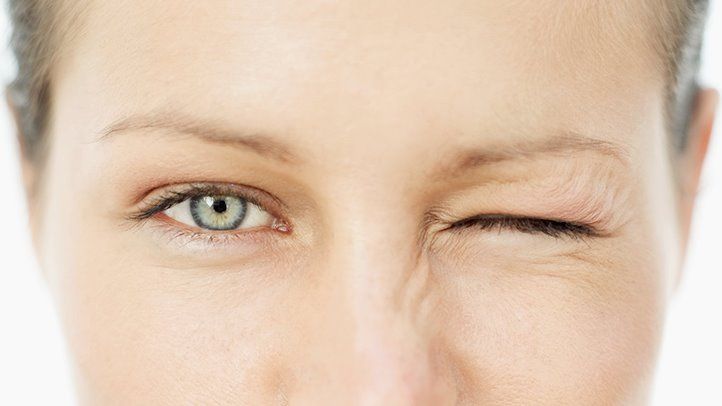We all have encountered such an unpleasant phenomenon as twitching of the eyes or nerve tic. Such muscle spasms can repeat very often, sometimes even for several days. A person cannot control this phenomenon and suppress the tic, so often there is nothing left but to wait for it to end by itself. Although eye twitching and spasms of the eyelid are not dangerous in nature, this problem cannot be ignored. Such a tic indicates possible problems in the body. In this article we will discuss the main reasons why the eyes twitch, what causes it, methods of prevention and treatment.
WHAT IS NERVE TIC
Nerve tic is a repeated movement that occurs during the contraction of a certain group of muscles. Eye tic or eyelid twitching is a phenomenon in which both eyelids or the muscles of both eyes contract strongly.
Another phenomenon often mistaken for nerve tic is eyelid myokymia. Eyelid myokymia is an involuntary contraction of the upper or lower eyelid, often accompanied by less frequent twitching and painlessness.
Both phenomena involve temporary or permanent contraction of the eye muscles.
It often happens that the eyes continue to twitch for several days and cause significant discomfort in a person’s life: it interferes with concentration at work, rest, leading a full life, driving, etc.
Why is the eye twitching: Causes
In most cases, the main cause of why the eye starts twitching is muscle tension, which is often associated with the patient’s lifestyle and rhythm of life. This problem is also encountered by residents of large cities.
Let’s look at some of the reasons why the eye can twitch:
- Emotional shock, strong experiences and excitement, stress, exhaustion and depression. Such problems and stressful situations often arise from a person’s modern lifestyle. As a result, a high release of adrenaline can occur, leading to involuntary muscle contraction of the eye and twitching. And not only strong stresses and shocks can contribute to this.
- Problems and diseases of the visual organs. Most often these are the patient’s vision problems that he does not treat and does not correct. For example, he refuses to wear glasses or even does not suspect about vision problems, astigmatism, myopia and other diseases.
Dryness of the conjunctiva or “dry eye”. The cornea does not receive enough moisture. Often occurs during allergies, prolonged work at a computer or television screen, in smokers or when taking certain medications. - Lack of sleep. For each person, the norm of sleep is individual, and in the absence of a full rest, the muscles do not have time to recover, which leads to tension and twitching of the eye.
- Exhaustion of the body, which occurs during hard work, poor sleep and lack of proper rest.
- Excessive consumption of alcoholic beverages. Abuse of alcohol strongly affects the human nervous system and leads to its disruption, which can provoke a nervous tic and affect the sleep mode.
- Consumption of drinks containing caffeine in large quantities. Caffeine is part of many drinks: coffee, tea, soda, energy drinks, chocolate. This component greatly increases the sensitivity of the body’s muscles and their reaction to external irritants.
- Lack of comfortable working conditions. Muscle tension of the eye can occur due to prolonged work in poor lighting, constant use of a phone, computer monitor, papers.
- Avitaminosis, which occurs due to a lack of vitamins in the body. Often it can occur due to strict diets or fasting.
- Pregnancy, which is a great stress for a woman’s body, due to which a lack of necessary vitamins and trace elements can occur.
- Other neurological diseases of the patient.
When it is necessary to go to the doctor
If a tic occurs without any other symptoms, there is no need to worry. Sometimes, the body just needs a rest and a break in order to get rid of the nervous tic. However, if it is accompanied by poor health, fever, pain and other deviations, it is important to immediately consult a doctor for examination and consultation. After the examination, the doctor will be able to determine the possible causes of the tic and prescribe the necessary treatment and therapy.
Prevention and Treatment of Eye Tics
If you start twitching your eyes, the first step is to try to identify the possible cause. Sometimes the answer is obvious: for example, it can be poor sleep, lack of sleep or alcohol consumption. Sometimes the causes can be deeper: for example, weak body after illness or surgery.
To treat eye tics, it is necessary to consult a neurologist, sometimes a psychotherapist. If the problem is aggravated, the doctor may prescribe special medication. To relieve symptoms, speed up recovery and reduce the possibility of deterioration, doctors recommend following these recommendations:
- Adherence to the daily routine. Try to lead a balanced lifestyle: get up and go to bed at approximately the same time, and don’t forget to pay attention to proper rest and physical activity.
- Proper and balanced diet. A balanced diet allows the body to get all the necessary micronutrients and vitamins, and the exclusion of alcohol, caffeine and unhealthy food from this diet will undoubtedly give a positive result.
- Pay attention to health. Try to listen to your body and undergo preventive examinations by doctors every year. This will help to exclude the development and appearance of diseases that can be hidden.
- Do not self-medicate or treat with folk remedies.
- An active lifestyle. Try to spend more time exercising and exercising, as well as frequent walks in the fresh air.
- Proper organization of a comfortable working environment, lighting and general space.
- Reduction of the risk of stress situations and psycho-emotional stress.
- Care for vision. When any problems related to vision organs, dry eyes, vision deterioration, conjunctivitis, etc., it is necessary to consult a specialist. When working at a computer, in poor lighting, with papers and books, take a short break every 20 minutes to give your eyes a rest. You can also do special gymnastics for the eyes.
Most often, these simple steps will be enough to solve the problem with eye twitching. But it is important to remember that if there is no positive result or if the situation worsens, it is necessary to consult a doctor who will select the appropriate treatment, lenses or glasses if necessary.





No Comments